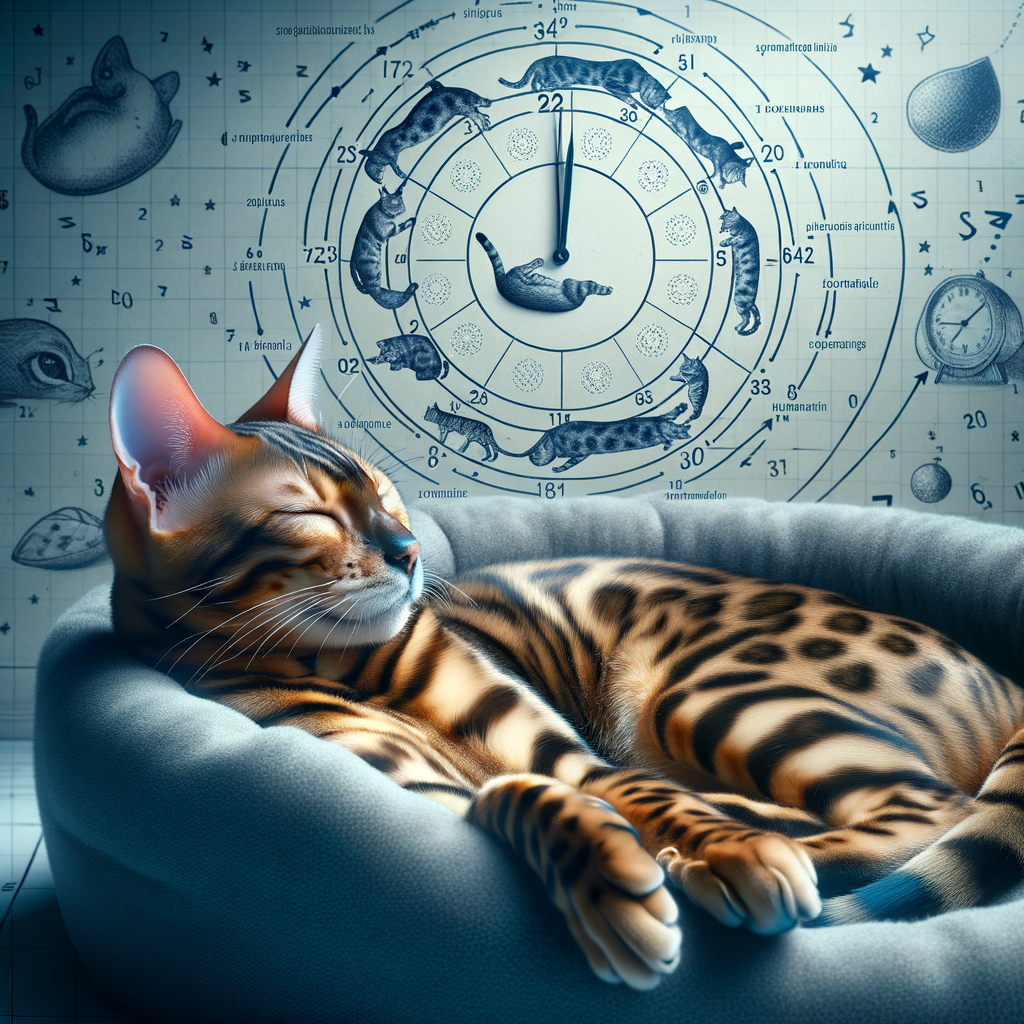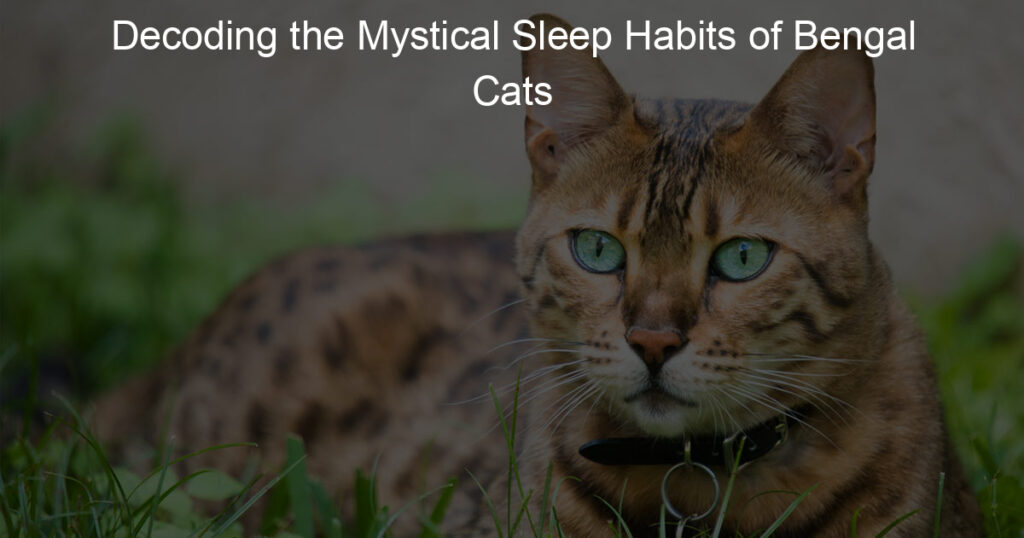
Introduction to Bengal Cats Sleep Habits
Have you ever wondered why your Bengal cat sleeps so much? Or maybe you’re curious about their unique sleep habits? In this blog post, we will delve into the fascinating world of Bengal cats and their sleep patterns. We’ll explore why sleep is so important in a Bengal cat’s life and how understanding their sleep habits can help you provide the best care for your furry friend.
Bengal cats are known for their unique sleep habits. Unlike humans, who typically sleep for a continuous period of 7-9 hours, Bengal cats sleep in short bursts throughout the day and night. This is a trait they share with their wild ancestors, who needed to be alert for potential threats and hunting opportunities at all times. Bengal cats can sleep anywhere from 12 to 16 hours a day, with kittens and older cats often sleeping even more.
Sleep plays a crucial role in a Bengal cat’s life. It’s during sleep that their bodies grow and repair themselves. Sleep also plays a key role in their mental health. A well-rested Bengal cat is more likely to be happy, playful, and energetic. On the other hand, a lack of sleep can lead to health problems, including obesity, heart disease, and even a shortened lifespan. Therefore, ensuring your Bengal cat gets enough sleep is essential for their overall well-being.
In the following sections, we’ll delve deeper into the unique sleep habits of Bengal cats, their sleep cycle, sleep schedule, and sleep requirements. We’ll also share some tips on how to ensure your Bengal cat gets the sleep they need. So, stay tuned!
Understanding Bengal Cats Behavior: Sleep Cycle
As we dive deeper into the unique sleep habits of Bengal cats, it’s important to first understand what a sleep cycle is and how it differs in Bengal cats compared to other breeds.
-
- What is a sleep cycle?
A sleep cycle refers to the pattern of sleep that all living creatures follow. It’s like a biological clock that tells us when to sleep and when to wake up. In cats, a sleep cycle consists of two main stages: Rapid Eye Movement (REM) sleep and Non-Rapid Eye Movement (NREM) sleep. During REM sleep, cats dream just like humans do. NREM sleep, on the other hand, is a deep sleep stage where their body repairs and regenerates itself.
-
- How Bengal cats’ sleep cycle differs from other breeds
Bengal cats are known for their active and playful nature. Unlike other cat breeds that sleep for about 13 to 14 hours a day, Bengal cats tend to have a shorter sleep cycle. They sleep for about 10 to 12 hours a day. This is because of their wild ancestry. Bengal cats are descendants of the Asian leopard cat, a wild cat species known for its active hunting lifestyle. This wild trait is still evident in Bengal cats, making them more active and less sleepy than other domestic cat breeds.
Understanding the sleep cycle of Bengal cats can help owners provide a suitable environment for them. It’s important to remember that each Bengal cat is unique and their sleep patterns may vary. However, knowing the general sleep behavior of Bengal cats can be a helpful guide for owners.
Unique Sleep Habits of Bengal Cats
When it comes to Bengal cats, their sleep habits are as unique and intriguing as their beautiful spotted coats. Let’s delve into some of these fascinating behaviors.
-
- Daytime Napping
Bengal cats are known for their love of daytime napping. This habit is a remnant of their wild ancestry, where daytime was the perfect time to rest and conserve energy for night-time hunting. A Bengal cat can sleep anywhere from 12 to 16 hours a day, with the majority of this sleep occurring during the day. They have a knack for finding the most comfortable spots in the house, whether it’s a sunny window sill or a soft blanket.
-
- Night-time Prowling
As the sun sets, Bengal cats shift from their daytime slumber to a period of activity. This night-time prowling is another trait inherited from their wild ancestors. They may spend this time exploring their surroundings, playing with toys, or engaging in a bit of mischief. This is their way of expending the energy they’ve conserved during the day. It’s important to provide them with plenty of toys and stimulation to satisfy their natural hunting instincts.
-
- Interaction with Owners During Their Sleep Cycle
One of the most endearing and sometimes challenging habits of Bengal cats is their tendency to interact with their owners during their sleep cycle. They may decide that the middle of the night is the perfect time for a play session or a cuddle. This can be a bit disruptive for their human companions, but it’s all part of the charm of owning a Bengal cat. To help mitigate this, try to engage your Bengal in play and activity during the evening hours to help tire them out before bedtime.
In conclusion, understanding the unique sleep habits of Bengal cats can help owners create an environment that caters to their needs and behaviors. By doing so, you can ensure a happy and healthy life for your feline friend.
Bengal Cats Sleep Schedule
Understanding a Bengal cat’s sleep schedule is crucial to ensure their health and well-being. Let’s delve into the typical sleep schedule of a Bengal cat.
Typical Sleep Schedule of a Bengal Cat
Like most cats, Bengal cats are crepuscular, which means they are most active during dawn and dusk. However, their sleep schedule can vary based on several factors. Let’s look at two key aspects of their sleep schedule.
-
- Hours of sleep required: On average, Bengal cats sleep for about 12-16 hours a day. This might seem a lot, but it’s perfectly normal for a healthy adult Bengal cat. Kittens and older cats may sleep even more, up to 18 hours a day. It’s important to note that if your Bengal cat is sleeping excessively or less than usual, it might be a sign of a health issue and you should consult with a vet.
- When do Bengal cats sleep the most?: Bengal cats usually sleep the most during the day, especially in the afternoon. This is because their natural instinct is to hunt in the morning and evening, so they rest during the day to conserve energy. However, they can adjust their sleep schedule to match their owner’s lifestyle. So, if you’re a night owl, don’t be surprised if your Bengal cat stays awake to keep you company!
Remember, every Bengal cat is unique and their sleep schedule can vary. It’s important to observe your cat’s behavior and consult with a vet if you notice any sudden changes in their sleep pattern.
Factors Influencing Bengal Cats Sleep Schedule
Just like humans, Bengal cats’ sleep schedules are not random. They are influenced by several factors. Let’s explore the three main factors that can affect the sleep schedule of your Bengal cat.
-
- Age
The age of your Bengal cat plays a significant role in determining its sleep schedule. Kittens require more sleep than adult cats. A Bengal kitten might sleep up to 20 hours a day, while an adult Bengal cat typically sleeps between 12 to 16 hours. As your Bengal cat grows older, you may notice changes in its sleep pattern. It’s essential to monitor these changes and adjust your cat’s routine accordingly.
-
- Diet
The diet of a Bengal cat also influences its sleep schedule. Cats that are fed a balanced and nutritious diet tend to have more regular sleep patterns. Foods rich in proteins and essential fats can help maintain your cat’s energy levels and promote healthy sleep. On the other hand, a poor diet can lead to health issues, which can disrupt your cat’s sleep. Therefore, it’s crucial to provide your Bengal cat with a balanced diet for a healthy sleep schedule.
-
- Environment
The environment in which your Bengal cat lives can significantly affect its sleep schedule. Bengal cats are sensitive to changes in their environment. Factors such as noise, light, temperature, and the presence of other pets or people can impact their sleep. A quiet, dark, and comfortable environment can help your Bengal cat get a good night’s sleep. It’s also important to provide your cat with a comfortable sleeping area to ensure it gets the rest it needs.
In conclusion, understanding the factors that influence your Bengal cat’s sleep schedule can help you provide the best care for your feline friend. By considering your cat’s age, diet, and environment, you can ensure that your Bengal cat gets the sleep it needs to stay healthy and happy.
Sleep Patterns of Bengal Cats
Understanding the sleep patterns of Bengal cats can provide valuable insights into their overall health and behavior. In this section, we will delve into identifying normal sleep patterns, including the stages of sleep and signs of healthy sleep.
Identifying Normal Sleep Patterns
Just like humans, Bengal cats go through various stages of sleep and exhibit certain signs that indicate they are having a healthy sleep. Let’s explore these aspects in detail.
-
- Stages of Sleep
Bengal cats, like all felines, experience two primary stages of sleep: Rapid Eye Movement (REM) and Non-Rapid Eye Movement (NREM). During the REM stage, Bengal cats may twitch, move their paws, or even ‘run’ in their sleep. This is completely normal and is a sign that they are dreaming. The NREM stage is a deep sleep stage where the cat’s body repairs and regrows tissues, builds bone and muscle, and strengthens the immune system.
-
- Signs of Healthy Sleep
A healthy Bengal cat typically sleeps for about 12-16 hours a day. Signs of healthy sleep include a relaxed body posture, regular breathing, and a lack of sudden awakenings. If your Bengal cat is sleeping peacefully without any signs of discomfort or restlessness, it’s a good indication that they are getting quality sleep.
By understanding the normal sleep patterns of Bengal cats, you can ensure your furry friend is getting the rest they need for a healthy and active life. Remember, sleep is not just a time for rest, but a crucial part of your Bengal cat’s overall well-being.
Recognizing Abnormal Sleep Patterns
While Bengal cats, like any other cats, have their unique sleep habits, it’s essential to recognize when these patterns become abnormal. Abnormal sleep patterns can indicate underlying health issues that need immediate attention. Here are some abnormal sleep patterns to watch out for:
-
- Excessive Sleep:
While it’s normal for Bengal cats to sleep for long hours, excessive sleep can be a cause for concern. If your Bengal cat is sleeping for more than 16 hours a day, it might be a sign of illness or depression. It’s essential to monitor their activity levels when they are awake. If they seem lethargic or uninterested in their usual activities, it might be time to consult a vet.
-
- Insomnia:
Insomnia in Bengal cats can be a sign of stress or anxiety. If your cat is having trouble falling asleep, or if they are awake for long periods during the night, it could be due to changes in their environment or health issues. Make sure their sleeping area is comfortable and free of disturbances. If the problem persists, seek professional help.
-
- Disrupted Sleep:
Disrupted sleep can be a sign of discomfort or pain in Bengal cats. If your cat frequently wakes up during their sleep or changes their sleeping position often, it could be due to physical discomfort. Look out for other signs of distress like changes in appetite or behavior. If you notice any such changes, it’s best to consult a vet immediately.
Remember, every Bengal cat is unique, and their sleep patterns can vary. However, any drastic changes in their sleep habits should not be ignored. Always consult a professional if you notice any abnormal sleep patterns in your Bengal cat.
Sleep Characteristics of Bengal Cats
The sleep characteristics of Bengal cats are unique and fascinating. Understanding these characteristics can help you better understand your Bengal cat and ensure they are getting the rest they need. Let’s delve into the physical characteristics of Bengal cats during sleep, their common sleep positions, and the meaning behind their sleeping habits.
-
Physical Characteristics During Sleep
When Bengal cats sleep, they exhibit several physical characteristics. Their body relaxes completely, and they may curl up into a ball or stretch out, depending on their preferred sleeping position. Their eyes are closed, and their breathing slows down. Some Bengal cats may even snore or twitch in their sleep, which is completely normal and a sign of deep sleep. It’s also common for them to have rapid eye movement (REM) sleep, during which they may dream just like humans do!
-
Common Sleep Positions
Bengal cats have a few favorite sleep positions. The most common one is the ‘loaf’ position, where they tuck their paws under their body and look like a loaf of bread. Another popular position is the ‘side sleeper,’ where they lay on their side with their legs stretched out. Some Bengal cats prefer the ‘superman’ position, where they lay on their stomach with their legs stretched out behind them. Each of these positions indicates a comfortable and relaxed cat.
-
Sleeping Habits and Their Meanings
Bengal cats’ sleeping habits can tell you a lot about their health and happiness. A Bengal cat that sleeps a lot during the day might be bored or not getting enough stimulation. On the other hand, a Bengal cat that is active at night might be hunting or playing, which is a natural behavior for this breed. If your Bengal cat is sleeping more or less than usual, it could be a sign of stress or illness, and you should consult with a vet.
Understanding the sleep characteristics of Bengal cats can help you ensure your furry friend is getting the rest they need. Remember, every cat is unique, so what works for one might not work for another. Always pay attention to your Bengal cat’s individual needs and behaviors to ensure they are happy and healthy.
Bengal Cats Sleep Requirements
As a cat owner, it’s crucial to understand the sleep requirements of your Bengal cat. This knowledge will help you ensure your pet’s health and happiness. Let’s delve into the specifics.
Understanding Sleep Requirements
Understanding the sleep requirements of Bengal cats is not as complex as it might seem. It involves knowing how much sleep they need and why it is essential to meet these requirements.
-
- How much sleep do Bengal cats need?
Bengal cats, like most felines, require a significant amount of sleep. On average, a Bengal cat sleeps for about 13 to 16 hours a day. However, this can vary depending on their age, diet, and activity level. Kittens and older cats tend to sleep more than young and adult cats.
-
- Importance of fulfilling sleep requirements
Ensuring that your Bengal cat gets the right amount of sleep is vital for their health and well-being. Sleep helps cats conserve energy, aids in their growth and development, and contributes to a healthy immune system. Lack of adequate sleep can lead to stress, behavioral issues, and even health problems.
In conclusion, understanding and meeting your Bengal cat’s sleep requirements is a key part of responsible pet ownership. It not only contributes to their overall health but also helps in building a strong bond between you and your feline friend.
Meeting Bengal Cats Sleep Requirements
Meeting the sleep requirements of Bengal cats is essential for their overall health and well-being. This can be achieved through two key strategies: creating a conducive sleep environment and establishing a consistent sleep schedule.
-
- Creating a conducive sleep environment
A conducive sleep environment is one that encourages rest and relaxation. For Bengal cats, this means providing a quiet, comfortable, and safe space for them to sleep. This could be a cozy cat bed in a quiet corner of your home, or a soft blanket in a secure spot. It’s important to ensure the area is free from loud noises and sudden disturbances that could interrupt their sleep. A good sleep environment also means maintaining a suitable temperature, as Bengal cats prefer a warm and cozy environment.
-
- Establishing a consistent sleep schedule
Like humans, Bengal cats thrive on routine. Establishing a consistent sleep schedule can help regulate their internal body clock, leading to better sleep quality. This means feeding them, playing with them, and putting them to bed at the same times every day. Over time, your Bengal cat will become accustomed to this schedule and will naturally start to feel sleepy around bedtime. Remember, consistency is key. Even on weekends or days off, try to stick to the same schedule to avoid confusing your cat and disrupting their sleep pattern.
By creating a conducive sleep environment and establishing a consistent sleep schedule, you can ensure your Bengal cat gets the rest they need. This not only contributes to their physical health but also their mental well-being, leading to a happier, healthier cat.
Conclusion: Decoding the Mystical Sleep Habits of Bengal Cats
As we reach the end of our journey into the fascinating world of Bengal cats and their sleep habits, it’s time to recap the key points and share some final thoughts.
-
- Summary of Key Points
Throughout this article, we’ve learned that Bengal cats have unique sleep habits that set them apart from other breeds. Their sleep cycle is largely influenced by their wild ancestry, which means they are more active during dawn and dusk. We’ve also discovered that Bengal cats have a specific sleep schedule, and they require a certain amount of sleep to stay healthy and active.
-
- Final Thoughts on Understanding and Accommodating Bengal Cats’ Sleep Habits
Understanding the sleep habits of Bengal cats is not just an interesting exploration into their behavior, but it’s also crucial for their well-being. By accommodating their sleep schedule and requirements, we can ensure that our Bengal cats lead a healthy and happy life.
Remember, every Bengal cat is unique. While we’ve provided general insights and guidelines, it’s important to observe your own Bengal cat’s behavior to understand their specific sleep habits. This will allow you to create an environment that caters to their needs and promotes their overall health.
In conclusion, the mystical sleep habits of Bengal cats are a testament to their unique nature and wild ancestry. As responsible pet owners, it’s our duty to understand and accommodate these habits to ensure our furry friends are as comfortable and content as possible.














